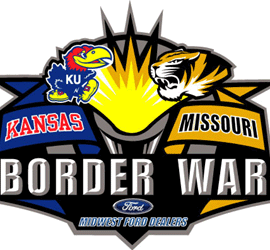
I often muse about what it would be like to have relocated to a city without a strong and divisive college rivalry. Don’t get me wrong – I like living in Kansas City (quite a lot, actually). But when I moved here, I was unaware of how significantly one’s alma mater could be translated into a marker of one’s social worth. For those unaware, Kansas City is an urban hub in the Midwest that, despite the name, straddles two states: Kansas and Missouri. While there are a number of colleges and universities within the city itself, Kansas City is populated by very large numbers of people who been schooled at either the University of Missouri, Columbia (“Mizzou” or “MU”), or the University of Kansas (better known as “KU”) in the nearby town of Lawrence.
What I find interesting about this situation is that, as a person lacking an affiliation with (and strong feelings about) either school, I find it relatively difficult to find pockets of university-related neutrality in the circles in which I run. My children’s public school occasionally incorporates a Jayhawk, which is the KU mascot, into otherwise mundane paperwork. A not-insignificant number of my friends have decorated their homes with pictures of their respective campus or other sorts of college memorabilia. It’s not uncommon to find people who hesitate to move across the state line (either way, depending on their loyalties) for fear that just a couple of miles will render them some sort of traitor or a “sell out,” even when such a decision might save them money or significantly improve their quality of life. Moreover, I know a few folks who have openly banned their children from ever attending their rival school, or who refuse to fund them if they go there – and they mean it.
It seems to me that the question at hand is why one’s college affiliation is so closely aligned with one’s identity. I don’t believe it’s as simple as saying that college is an important time of life, or that many great memories are formed there. Although these things are often true, mountains of evidence indicate that long before we ever think of the ivory towers of higher education, our preschool and elementary experiences do more to influence our educational futures than any other sort of formal experience. Despite this, we don’t have a picture of that playground professionally matted and hung above the fireplace.
I also don’t think this is about the quality of education one received or one’s own academic prowess (for rarely, if ever, does this rivalry turn to conversations about majors and critical thinking skills), nor is it just about sports, since most of us are not the actual athletes that we’re cheering on. One could say that it’s all just a simple distinction made in good fun, but I think that this, too, falls short, for it neither answers why the distinction is interesting in the first place, nor does it account for the very intense devotion that many alums feel.
Rather, I suspect that what the college rivalry boils down to is nothing much at all, for at the end of the day, most of us know that a similarly fun, educational, and life-changing experience can be found at any number of different institutions. In other words, “school spirit” is more about creating the aura of a school’s (and by extension, one’s own) superiority than it is about any sort of actual marker of uniqueness.
So why do we add fuel to the fires of school rivalries? From a structural perspective, such contests are an incredibly easy method of distinction-making, which is itself one of the most basic components of social life and cultural valuation. In this sense, knowing the fight song or wearing the school colors are no more than duplications of the very basic way in which people must distinguish themselves from one another in order to recognize how they are granted worth within the social networks in which they operate. Knowing that you went to this school and I went to that one establishes at least one small way that we can identify the markers through which we categorize each other.
But what about one’s unforgettable experiences available at a particular college, or that “special something” that you just won’t find at any other school, as admissions literature often promises? Consider the numerous psychological studies that are designed to measure what’s called in-group favoritism (or in-group loyalty), wherein individuals are randomly assigned to a group identified only as “A” or “B.” In many cases, the individuals are aware of the randomness of their membership, as well as the fictitious character of the group of which they are at least temporarily a part. What these studies unequivocally show is that the very act of being told you’re a member of a group bolsters your loyalty and positive feelings for it, even when you know it’s completely fabricated. In short, having a group — and knowing that others are a part of it — is reason enough in most people’s minds to buy the overpriced coffee mug.
